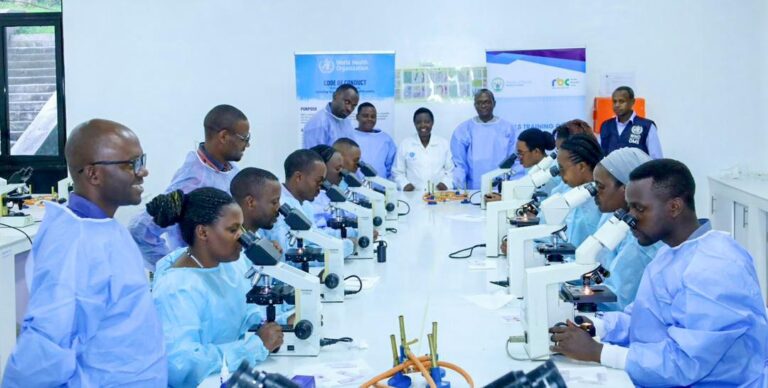
Laboratory technicians during the training in Huye in November 2023
Within the sterile, brightly lit, and meticulously organized laboratory of Kibungo Hospital, three dedicated women, clothed in white coats and gloves, are sowing the seeds of a healthy Rwanda.
A young woman, Francine Umubyeyi Kayitesi, attentively analyzes blood samples with her microscope, her eyes gleaming with confidence. She and her two colleagues are part of a growing network of laboratory technicians who received intensive training on clinical bacteriology organized by World Health Organization (WHO) and Rwanda Biomedical Centre (RBC), funded by the European Union (EU). Since 2023, through this partnership, 222 laboratory technicians from both public and private laboratories were trained on sample collection, management, processing, together with basic bacteriological testing, antimicrobial susceptibility testing and antimicrobial resistance data management.
“Before the training, blood culture used to take us 7 days, which would delay diagnosis for patients who required a blood culture to guide treatment, thus putting them at risk of not getting the right medications on time.” says Francine.
Similarly, from the other side of the country, Jacqueline Mukanshuti, a laboratory technician at Butaro Hospital, adds: “We used to get inaccurate results, making the patient stay longer in the hospital, because we had to redo the tests.”
The laboratory technicians explained how the extended duration for obtaining laboratory results stemmed from inadequate laboratory capacity giving rise to insufficient samples being collected, contaminated samples, or not isolating bacteria correctly during laboratory testing.
Dr Isabelle Mukagatare, Head of Biomedical Services at Rwanda Biomedical Centre highlighted that laboratory technicians faced challenges prior to the training such as limited knowledge on bacteria identification and the use of international standards for interpretation of results. “We needed to reinforce the capacity of laboratory technicians to ensure quality assurance in laboratories and raise awareness on the issue of antimicrobial resistance.” she adds.
The training they received has now enabled the laboratory technicians to produce more accurate results, obviating the need for repeated tests, and significantly reducing turnaround time.
“Thanks to the training, the turnaround time for obtaining laboratory results at our hospital is now reduced from about 7 days to only 3-5 days, because we learnt how to accurately collect samples and more efficiently identify the bacteria responsible for the disease in a patient.” shares Jacqueline.
With support from the European Investment Bank, the European Union and technical support from WHO, Rwanda has embarked on a groundbreaking venture to build a pioneering National Health Laboratory System (NHLS) designed to deliver more accurate diagnoses and empower clinicians for better patient care. Rwanda’s NHLS will bring together four selected divisions from the Rwanda Biomedical Centre (RBC): The National Reference Laboratory (NRL); Medical Technology (MTD); National Centre for Blood Transfusion (NCBT) and Research, Innovation & Data Science (RIDS).
Recognizing the crucial role that skilled personnel play in achieving long-term success, RBC and WHO in collaboration with the EU are building the capacity of the National Reference Laboratory staff to ensure error-free results and reliability in diagnosis for years to come. The main objective of the training was to reduce the turnaround time of bacterial identification by decentralizing bacteriology services to subnational levels to be in line of the NHLS vision and mission.
“This partnership between RBC, WHO and EU to train staff from the National Reference Laboratory (NRL) aligns with Rwanda’s health care goals. Rwanda seeks to enhance all its bacteriology labs, and through this initiative, NRL staff not only received training but also passed on their knowledge to other technicians, thus strengthening the laboratory network and promoting knowledge exchange.” says Dr Isabelle Mukagatare. (End)
